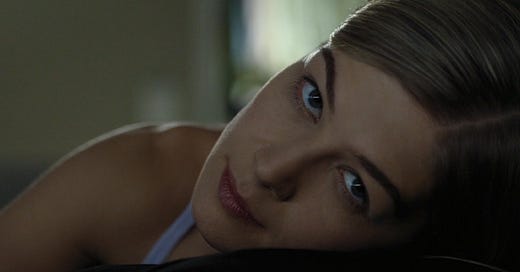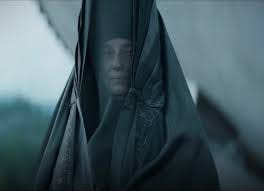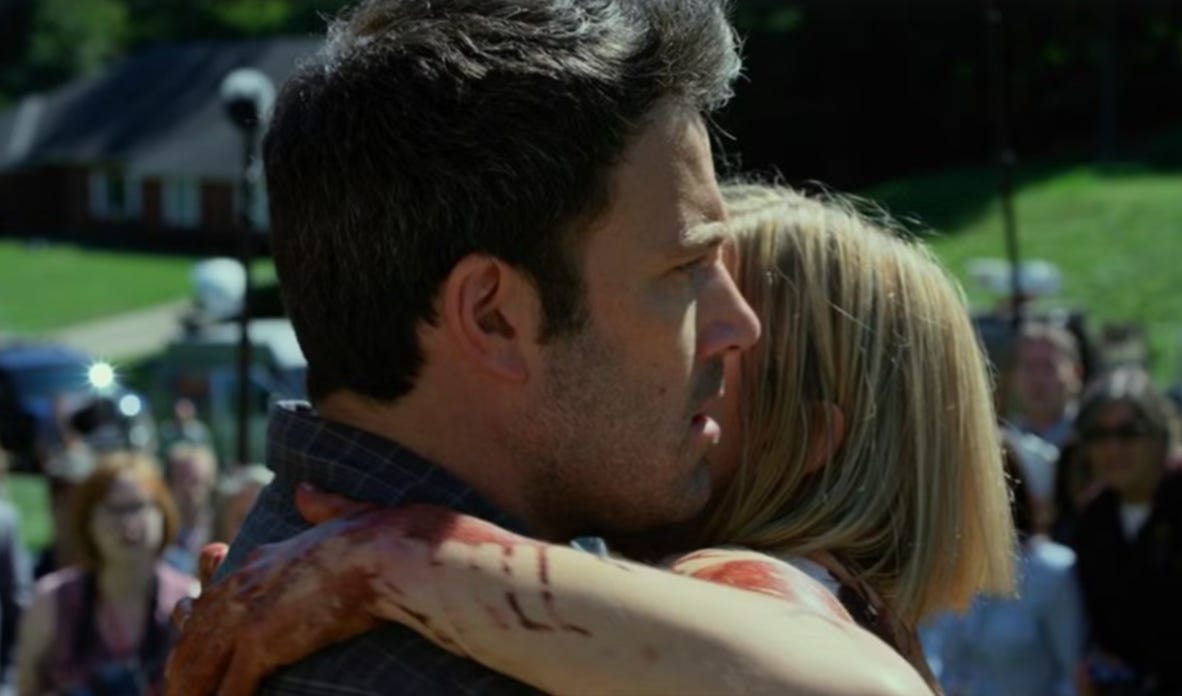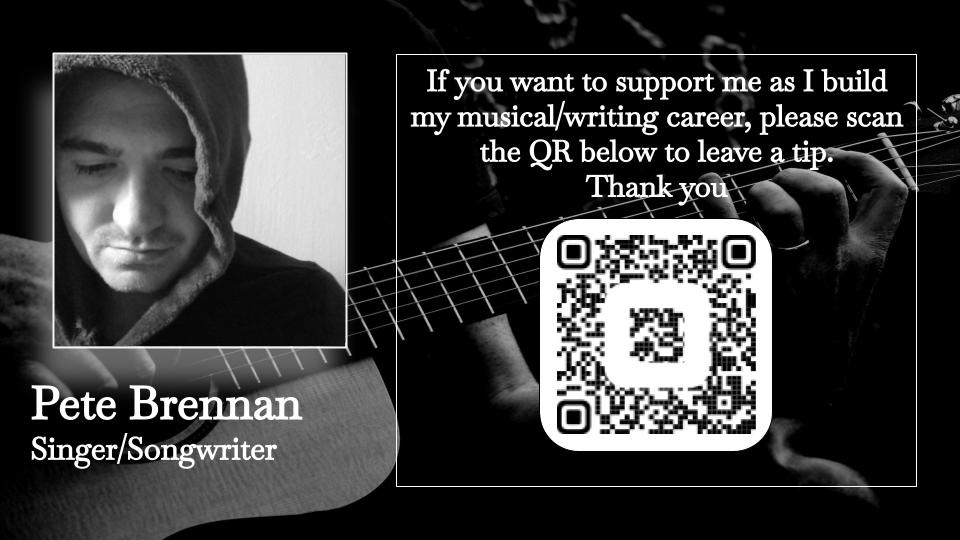Gone Girl: Why 'the Bunny Boiler' is every man's worst nightmare...
My thesis that Amy from Gone Girl is the scariest villain in all of fiction
As Storm Darragh raged across the UK on Saturday, 7th November 2024, everything was cancelled due to the dangerously high winds, including our planned Christmas shopping trip. Unnecessary travel was advised against so I planned to stay home that day, curl up on the sofa with an endless supply of coffee and watch the Premier League’s early kick-off, the Merseyside derby. But that was also cancelled due to the high winds. Damn it.
So with nothing else to do, my partner and I ended up spending that day together watching movies. We have very different tastes generally speaking but our interests overlap with a shared (& morbid) interest for true crime, crime thrillers & detective fiction which is what we ended up watching on that windy Saturday. And one of the films we watched was David Fincher’s 2014 masterpiece Gone Girl.
Fincher is one of my favourite filmmakers and is always my ‘go to’ when looking for a ‘crime’ movie: Zodiac, Se7en, The Girl with the Dragon Tattoo, and of course, the ‘cancelled too soon’ Netflix series Mindhunter. I love it all.
But something weird happened after this latest rewatch of Gone Girl with my partner. We did something we never do together after and talked about one of my passions that my partner normally has no interest in: Philosophy. Namely, philosophical matters pertaining to the character motivations in the film.
We both enjoyed the film immensely, but my partner seemed genuinely interested in how profoundly it affected my thinking compared to hers. The depth in which I could go into so many different aspects of the film’s narrative was miles away from her more passive watching experience and seemed alien to her. Normally, she has no interest in philosophy and typically glazes over whenever I use words like ‘ontological’ or ‘epistemic’. Likewise, she is mostly unconcerned with my overthinking about film and TV plots, but on this occasion she was interested in my deeper observations so I readily discussed with her what I had gleaned from the story..
We talked about the psychology of men and women and how they’re fundamentally different. Evolutionary psychology/biology and how they affect the typical behaviour of both men and women in different ways. The ethics of Amy’s plan. The role that the media and public perception plays in high profile criminal investigations like the case in the film and how it compares to the Menendez brothers case, etc. The way people tend to believe the best about women in these cases and assume the worst about men.
I'd like to share my perspective on some of the observations we made throughout this discussion. My partner gave me access to a feminine perspective on some of this stuff, as well as a ‘normie who doesn’t overthink everything’ perspective. This allowed me to test the rigour of some of my admittedly male-minded, layman philosopher assertions about the film against a woman’s viewpoint in conversation. What surprised me most was how little she knew about the trepidation a lot of men feel regarding women like Amy.
If anything I write below strikes you as bullshit, it well may be so and please tell me in the comments. It’s just what I have come to believe and I am always open to hearing arguments against my assertions. In fact, I welcome the challenge and the chance to fine tune my thinking further.
SPOILER WARNING: I’ll be ruining Gone Girl for anyone who hasn’t seen it yet. Please watch this film first if you haven’t seen it. It’s incredible.
Our discussion started in earnest when I made the throwaway claim that I thought that ‘Amy was the scariest character in all of fiction’. My partner seemed perplexed by this assertion. I explained that I believe that Amy was the archetypal representation of every man’s worst nightmare in terms of romantic relationships: a ‘Bunny Boiler’. A machiavellian, 4D chess playing master manipulator. A vengeful and vindictive mastermind, intent on destroying a man’s reputation, status and life.
The Bard said ‘Hell hath no fury like a woman scorned’ and he was rarely ever wrong. Amy (Rosamund Pike) is the quintessential scorned woman after discovering that her husband Nick (Ben Affleck) has been cheating on her with a younger woman from a Robin Thicc music video.
A well-educated and cunning intellectual, Amy launches into a meticulously planned revenge tour for over a year and a half that involves the framing for murder, psychological torture & the complete character assassination of her husband, Nick. Everything goes according to her plan perfectly until the last step, (committing suicide and her body turning up just in time to give the investigation it’s final clue to convict Nick with), which she can’t go through with. This is where she starts to improvise a new phase of her plan and things start going wrong as she hasn’t been planning every minute detail for months and she starts making mistakes.
This coincides with Nick starting to get the upper hand regarding the media narrative and turning the court of public opinion back in his favour a little. But Amy’s genius knows no bounds. She will not be denied her revenge and decides that the best way to get it is to miraculously return as a victim of the supposed kidnapping. This exonerates Nick of his involvement in her disappearance and saves him from prison while also forcing him to conform to the doting and remorseful husband character that he had been playing the part of on the TV for weeks.
So she launches into an even more extreme plan to reassert her authority in this toxic marriage which involves more deceit, manipulation and even murder. Spoiler, Amy wins. Nick is trapped in a marriage to a psychopath who everyone else sees as a sweet woman who was the victim of unspeakable crimes.
The manipulation. The passive aggressive resentment. The vindictiveness of this woman. The quintessential Bunny Boiler. A cunning, conniving and dictatorial psychological torturer who can emotionally manipulate you and others to her whim and control every part of your life. A terrifying villain.
I asked my partner if she agreed with me that the greatest fear for most women regarding being in a romantic relationship with a man is the threat of physical or sexual violence. She agreed and treated this assertion as completely uncontroversial.
In spite of the currently fashionable postmodernist ways of thinking about gender, men and women are not the same or interchangeable physically. In fact, they are demonstrably different physiologically speaking. Men are on average superior to women in every metric of physical prowess. They are taller, larger, sturdier, stronger, faster, etc. Ignoring these facts is dangerous and we’ve always known and acknowledged this throughout history until very recently.
So women, quite rightly, typically have a fear in their mind that if a man became abusive, he could do a lot of damage and even threaten her life. This makes sense.
Because of the vulnerability of their physical bodies comparative to men and the fact that they historically couldn’t attain their goals by exerting physical force, women have evolved other means of getting what they want. These methods are often referred to by experts under the blanket term ‘Female Aggression’ and involve emotional manipulation, reputation damage, slut shaming, virtue signalling & gossiping among others. All of these serve to move the chess pieces around to attain a goal or keep things within a manageable range.
‘Slut shaming’ historically kept the value of sex high by policing those women who would lower its cost with carefree, hedonistic actions. This ensured a level of scarcity in terms of access to sex in a society, which kept the value of it high and ensured that a good share of the power in sexual interactions remained with women.
Evolutionary speaking, women typically couldn’t get their way historically by means of physical force like males could so they had to develop these subtler and more cunning ways to attain their goals. They had to use their intellects; to strategize and move chess pieces around to turn events in their favour. Manipulate and influence the people who were in a position of power until they could acquire some for themselves, like the Bene Gesserit in Dune or Cersi in Game of Thrones. Think ‘Mean Girls’ style tactics.
My thinking on these matters is informed by my insatiable habit for listening to podcasts, lectures and audiobooks about this stuff from experts in the related fields. Evolutionary psychologists, Biologists and Behavioral psychologists like Dr Diana Fleischman, Rob Henderson, Jordan Peterson, Steven Pinker, Richard Dawkins, etc.
This stuff is controversial to talk about in the modern social climate and a lot of people feel uncomfortable with it, which explains why most of the aforementioned experts are seen as controversial, heterodox and sometimes as heretical. But the facts don’t care about anyone's feelings and there is a lot of evidence for all of the above claims. Those who are experts in these fields, particularly Evolutionary Psychology, have been met with a lot of backlash from the dominant ideology in academic circles (Wokeness) in recent years because it is antithetical to the tenets of that faith.
The best explanation of this topic I still think is this old interview with Dr Diana Fleischman on
. In it, she details why Evolutionary Psychology is seen as so divisive and controversial these days, why the uncomfortable truth of reality must be faced head on and the implications of the behavioural differences between men and women. I recommend watching this interview if this stuff interests you.These fields of study show how men and women are fundamentally different physically and how that fact has shaped the evolutionary paths of both sexes. This spits in the face of the claim that ‘gender is an entirely social construct’ and that women are equal to (if not better than) men in any and every domain and thus interchangeable.
But equality is a political construct and equal rights means exactly that: politically equal. Men and women have the same political standing in society. Their votes count the same. Their rights are afforded and protected equally. Etc, etc.
But the cold hard reality is that men and women are not physically equal and their concurrent evolution has been shaped by that fact. In light of this reality, in a civilised society, no women should be expected to compete physically with a man; in sport or any other domain. It is, quite simply, not a fair fight.
So it makes sense that the threat of physical violence from a man would be a great source of fear to women, given our evolutionary history. But just as it produced the greatest fear for women in regards to their romantic relationships with men, the same evolutionary process has produced the antithesis of this fear in men.
I believe that a typical man’s greatest fear is a vindictive, spiteful, cunning and vengeful woman who will use all her Bene Gesserit skill to destroy us emotionally, mentally and reputationally: the ‘Bunny Boiling’ Amy. Amy is our greatest fear in a romantic relationship. The thing that gives us pause when embarking on a new romantic commitment.
In spite of these kinds of characters being portrayed in books, movies and entertainment throughout her life, my partner had never made this connection. She had never realised that this is a common fear a lot (if not most) men have. A fear that I argue is as common in men as the fear of a man’s strength being used against her is to women.
The character of Amy in Gone Girl is the best I have ever seen this fear personified on film, and I love how it unapologetically makes her the ‘bad guy’ of the story. Even without her manipulation and murder of the character Desi, (an act that I think exists purely to solidify her as the bad guy by making her cross that line), I still believe she is the villain of the film.
Yes, Nick cheated on her with a younger woman, a student of his no less. That was both an inexcusable and a shitty thing to do. But the film expertly shows you that, even though Nick was in no way a ‘good guy’, he didn’t deserve what Amy put him (and his twin sister) through in revenge. He was an asshole sure, and Amy had every right to feel hurt and angry. But her actions were disproportionate, vindictive and petty. Nick did a bad thing, but what Amy did was worse. And two wrongs don’t make a right, ever.
I am also apprehensive about the idea of vigilante justice as a concept. Whatever justice is, it surely cannot be doled out from a mindset of revenge by the victim or someone close to them as their judgement would certainly be tainted by bias. This is why we do not allow jurors and police officers to be involved in cases where they know anyone involved personally, it’s a conflict of interest.
The other point we talked about was how Amy used the media and people’s preconceived notions about men and women to manipulate the narrative around her disappearance. In instances of conflict between men and women, people tend to believe women are victims and suspect men of wrongdoing. I believe part of this is again due to the physical disparities between the sexes. Women are vulnerable to the physical strength of men and I think that influences the assumptions people make and what they believe.
Like how the hashtag ‘Believe all Women’ spreading like a social contagion after the #MeToo movement showed, people are quick to assume that in any case of men versus women, the man is guilty of oppressing and the woman is a sweet little victim. Now, in many if not most cases, this is often correct. But crucially, not all.
There are countless examples of false accusations of rape, assault and violence against high profile men from women who are looking to exploit them for financial gain. In many of these cases, the media and public discourse instantly jump on the narrative that the man is guilty and run with it. Rather than operating under the liberal notion of ‘Innocent until proven guilty’, these men are convicted in the court of public opinion and their reputations are damaged, often irreparably.
In the cases where the man is guilty, he should be ostracised and shunned by civilised society in my view, but only after he is convicted. Too many innocent people have had their lives ruined by fictitious allegations and fraudulent claims. We have to adhere to the rule of ‘Innocent until proven guilty’ to ensure that that doesn’t happen and if we want to continue to call ourselves a civilised and fair society.
Gone Girl demonstrates both these points in spades. The media’s bloodlust for a compelling story and the public's willingness to believe the man must be the villain allows their imaginations to run wild and propagate a fictitious narrative and a witch hunt against Nick. This destroyed his life. Amy knew all of this and played all of these people like a fiddle.
I believe this is the film’s greatest triumph. It exposes how preconceived notions and biases about men and women can lead the public to make assumptions and draw premature conclusions about the players in these high profile cases. Without waiting for the actual evidence of the cases to materialise, these assumptions can just as easily be false as they could be true. And false assumptions can be devastating to the innocent.
That was just a summary of the points we talked about that windy day after watching this incredible film. It’s not a cohesive philosophical argument, more a recounting of a thought process and resulting conversation between two people with very different perspectives. I was happy to have these kinds of conversations with my partner for once and it’s been on my mind ever since. I can’t sleep when I start fixating on things and I’ve found the only way to get it off my chest and find sleep is to write it all down. That’s what these philosophical Substack essays are in reality, my sleep therapy so thanks for helping me put my mind to rest.
I hope you enjoyed it. (God, this was a long one).
Thanks for reading, The Common Centrist













Not only do men fear social ostracism/ social condemnation, they live it every day. Men do not enjoy automatic membership of 'society' as women do. They are treated as a threat by default and they must convince women of their benevolence (and utility) before women grant them (temporary) entry into society (AKA social approval).
There was a clip going round a while back of a trans identified young woman who had fully transitioned and was living as a man and was now sobbing into the camera because living as a man was so brutally lonely and harsh. The horrifying realisation was something along the lines of "I used to feel more warmth, acceptance and emotional connection talking to random women in the women's bathroom than I ever get in society now as a man where I am now shunned by everyone".
Men's default status is to be 'suspect' and 'potentially a threat' and therefore best to avoid. Men can only counter this by being super high status (expensive suit, obviously rich etc) or by having a woman with him who signals her ease and therefore marks him as already approved.
Ordinary men wandering about on their own are basically rapists and axe murderers to be avoided (this is what it would feel like for most women to spend a day in an ordinary guy's shoes).
This is why reputational destruction (a woman's primary means of attack) is so feared by men. They are already skating on thin ice as it is - just for being men. A woman's disapproval or scorn - never mind something like a false rape accusation - is enough to send him to the very margins of society. And studies are clear that being socially ostracised and socially condemned has the same effect as actual physical abuse. It is extremely harmful to health with profound physiological effects, and it will reduce life expectancy (perhaps why men have shorter lives than women on average).
Thought-provoking article all throughout!
I think it's also worth considering that a significant faction of the younger viewers are inclined to sympathize with Amy. So many on social media will cite the "Cool Girl" speech and then caption it "Amy Dunne did nothing wrong", it's surreal. Perhaps they see themselves in her? All I know is that I personally really hated her character, not even in a magnificent villain way (I have a lot more respect for Light Yagami, haha), but just loathed her.
In a sense, I wonder if it's the polar opposite of the American Psycho phenomenon? Bateman is pretty ostentatious about his strength and ability to inflict violence. While I don't think guys idolize him, he *is* meme-ified much more often by them.